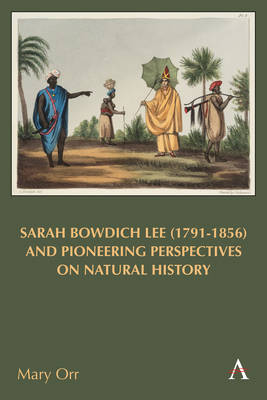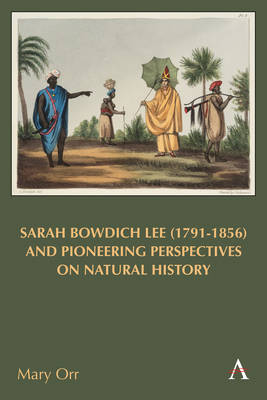
- Afhalen na 1 uur in een winkel met voorraad
- In januari gratis thuislevering in België
- Ruim aanbod met 7 miljoen producten
- Afhalen na 1 uur in een winkel met voorraad
- In januari gratis thuislevering in België
- Ruim aanbod met 7 miljoen producten
Sarah Bowdich Lee (1791-1856) and Pioneering Perspectives on Natural History
Mary OrrOmschrijving
History from below has particular advantages. It uncovers overlooked protagonists in (inter)national endeavour for their importance and wider significance, and plots triumphs of discovery and contribution to knowledge where they are supposed not to occur. One such figure is (British-born) Sarah née Wallace, Mrs T. Edward Bowdich then Mrs R. Lee (1791-1856). Despite her multiple contributions to new natural history and its publication in both France and Britain in the first half of the nineteenth century, no monograph study has attended to her life's workin independent natural history-making for its interdisciplinary range and perspectives, or explored its intercultural significance through the double contexts of expert French and British natural history and publication.
- In making good these omissions, this book does much more than provide a first concerted recuperation and examination of Sarah's unbrokenproduction of science publications from 1825 until her death in 1856 that intermediated 'French' and 'British' natural history in several new fields and in multiple genres. More importantly, the focus is on how Sarah's expert productivity was also achieved, when she had to overcome significant scientific losses - of new specimens from the field, of major international mentors - severally in her 'career'. If these lynch-pin moments frame the three main sections of the book, and the chapters each contain, the larger story of Sarah's overcoming and successes form a case study that can better draw attention to the circumstances and conditions in which Sarah's largely unheralded contributions and triumphs were achieved. Since at least one 'small' achievement in scientific endeavour merges in each chapter, the record can be set straight concerning Sarah's importance at the forefront of new sub-disciplines in French as well as British science from the 1820s to the 1850s, for example, ichthyology (in Part One), ethnography (in Part Two) and science dissemination and education (in Part Three).
- The lynch-pin moments and framing conditions of production informing them add significant creative and pragmatic twists to an alternative story for expert science and natural history-makingthat overcomes seemingly impossible personal and sociocultural odds irrespective of gender. Sarah's multiple non-conformism then makes for a fascinating case study and historical precedent for re-examining women's independent contributions in the history of nineteenth-century science as precedent-setting by comparison with 'leaky pipeline' modelling for women's careers and work in STEM(M) today. The book's closing inquiry thus calls for new perspectives following Sarah's example, to challenge the understanding of 'serious' natural history-making as inclusive of inter medial forms. The possibility, creativity and distinction of Sarah's story is the distinguishing feature of this book.
Specificaties
Betrokkenen
- Auteur(s):
- Uitgeverij:
Inhoud
- Aantal bladzijden:
- 310
- Taal:
- Engels
- Reeks:
Eigenschappen
- Productcode (EAN):
- 9781839986093
- Verschijningsdatum:
- 17/09/2024
- Uitvoering:
- Hardcover
- Formaat:
- Genaaid
- Afmetingen:
- 152 mm x 229 mm
- Gewicht:
- 625 g

Alleen bij Standaard Boekhandel
Beoordelingen
We publiceren alleen reviews die voldoen aan de voorwaarden voor reviews. Bekijk onze voorwaarden voor reviews.









